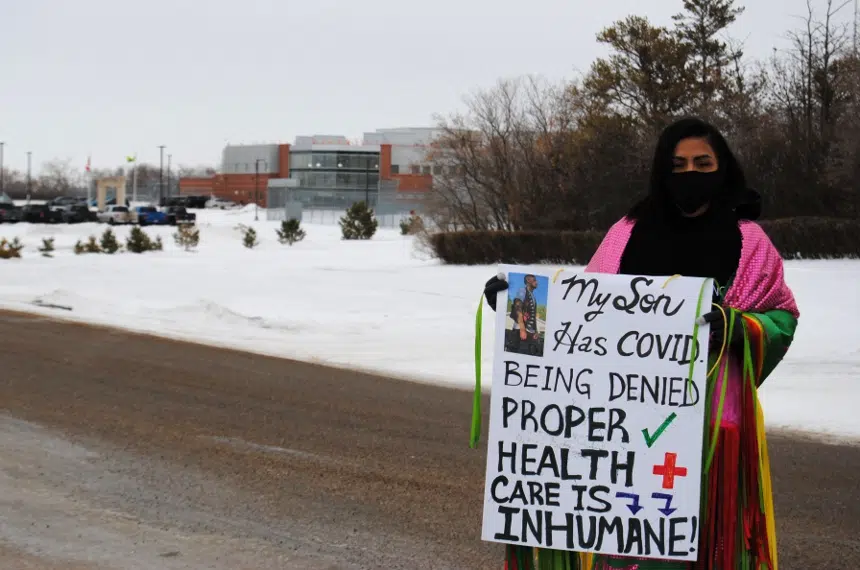Just as COVID-19 spread through communities in Saskatchewan, it’s now spreading through jails and penitentiaries as well.
As of Monday, there were 63 inmates and 12 staff at the Regina Correctional Centre with active COVID cases. There’s also one at the Saskatoon Correctional Centre, 14 at the Prince Albert Correctional Centre, and three at the Pine Grove Correctional Centre.
Inmates at some jails have caused “disturbances” or started hunger strikes to protest the conditions they’re facing.
On Tuesday, about two dozen people protested on the road outside the Regina Correctional Centre, many of them family of people on the inside.
Julie Paul said her 26-year-old son, River, was diagnosed with COVID-19 about a week ago, and because of the restrictions keeping inmates in their cells, he wasn’t able to call for several days to tell her.
“It’s so painful to know that your son’s suffering in jail,” Paul said before pausing, her voice filling with emotion. “It’s so hard to see all our sons going through this and not being able to get help. It’s bad enough that COVID is bad for the world, but when you’re in jail, nobody cares. It’s just so horrible.”
Paul said her son can’t taste or smell and his voice doesn’t sound good, but she said there are others in the jail worse than that whom she says are not being taken care of.
“They are so very scared for (their lives) because they are being left there without any help,” Paul said.
Paul said the people with COVID aren’t being checked on, neither by staff nor by doctors.
“Some of them can’t really breathe very well … they only have tap water. They don’t have access to their usual canteen so they’re really suffering,” she said.
Paul explained her son had to demand to get Tylenol, and was given only one dose. She said she’s tried to call her MLA and the administration at the jail but hasn’t got any calls back.
She said she wants her son and others in the jail to know that they haven’t been forgotten.
“They deserve to have the right to be helped, to be cared for when they’re sick with COVID,” said Paul.
She and the other protesters are asking for changes in the jails: For proper medical care, medication like Tylenol, blankets, books and TV, more phone calls to family, hot water and access to their canteens. They’re also asking for inmates who can be let out to be released if possible.
Paul lays blame for how bad things have become at the feet of the Minister for Corrections, Policing and Public Safety Christine Tell.
“She’s not doing anything,” said Paul of Tell.
Paul said Tell should be removed from her office.
Chief Okimaw Iskwew Margaret Bear of the Ochapowace First Nation east of Regina was at the protest as well. She commended Paul for putting together the protest and also called out Tell.
“From one woman to the other, from one mother to the other, I call upon you to do better, to come and do your job here, to ensure the safety and well-being of the inmates,” said Bear.
NDP Corrections Critic Nicole Sarauer was at the protest to support the families and joined in the call for Tell to step down as minister. Sarauer said Tell has been absent on these problems.
“The moms here today have very legitimate concerns and aren’t getting answers from anybody, aren’t getting access to their loved ones — even over the phone — and are concerned about their access to adequate health care, which isn’t great in our jails at the best of times and is even worse right now,” said Sarauer.
Sarauer said everyone deserves access to meals, health care, shelter and loved ones. She insisted that access shouldn’t be taken away just because it’s happening in a prison.
In a statement sent to media, Tell didn’t address the calls for her resignation but did talk about measures the ministry has taken.
“We have taken a number of steps to reduce the risk of COVID-19 in our facilities, which includes mandatory masking; testing upon admission and as directed by public health authorities, quarantining new admissions for 14 days; and establishing temporary structures to provide flexibility in managing the correctional population,” said Tell in the statement.
Tell also said inmates are being informed about COVID measures and the ministry has taken steps to make sure inmates can keep in contact with their loved ones with three calls a day to friends and family, although access to those calls could be dependent on current isolation rules in place. Inmates are also allowed calls — free of charge — to Elders and chaplains.
The Ministry of Corrections released a statement as well in response to allegations made at the protest. It detailed measures taken to protect staff and inmates, including cancelling in-person visitation, quarantining and testing new admissions, continuous masking, and enhanced cleaning.
The statement also said nurse practitioners are monitoring people with COVID and that the facility works with staff and public health to make sure inmates get the care they need.
“In the event an offender requires health services beyond what is available in a correctional facility, staff will ensure this is provided,” read the statement.
The ministry also said it’s working with public health when making decisions around testing.
“We are reviewing what resources and training would be required to implement voluntary COVID-19 surveillance testing for inmates in provincial correctional centres. Voluntary testing was made available to staff at the Regina Correctional Centre late last week,” said the statement.
Editor’s note: This story has been amended after the Ministry of Corrections provided more information on phone calls











